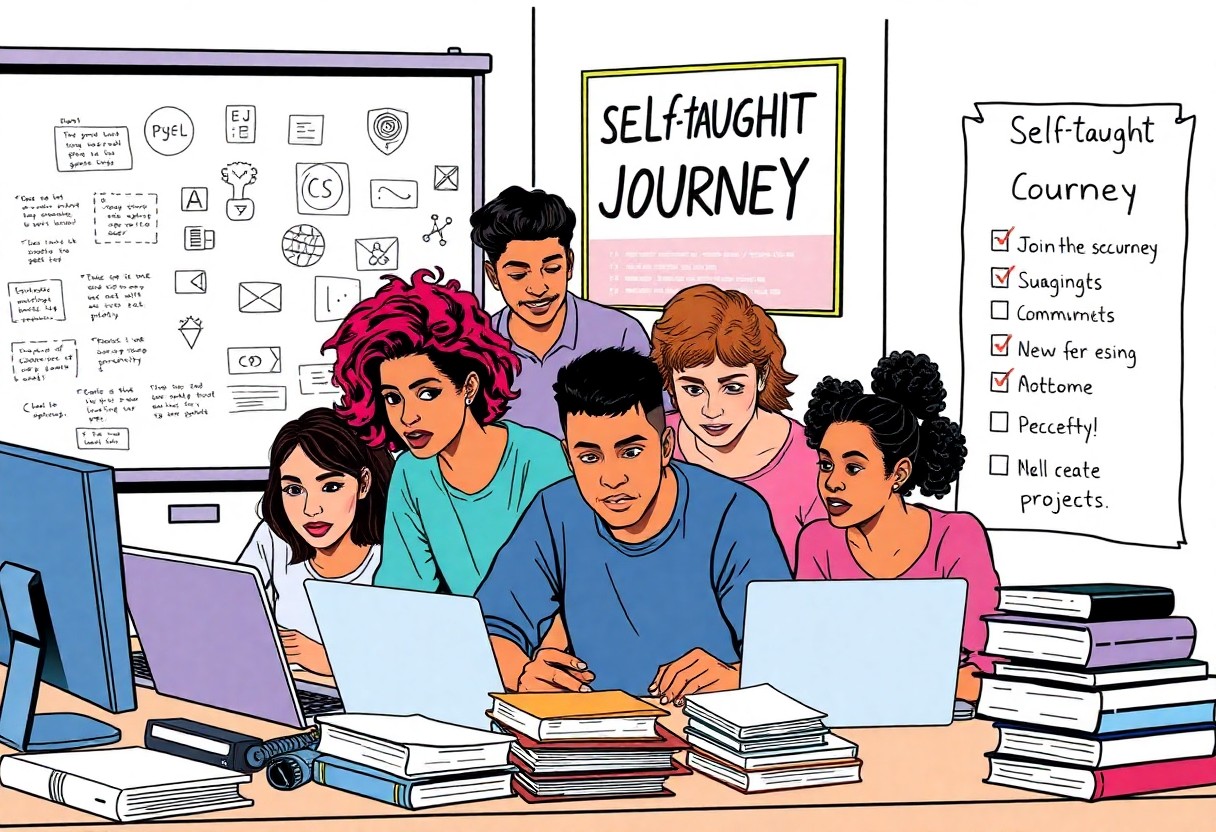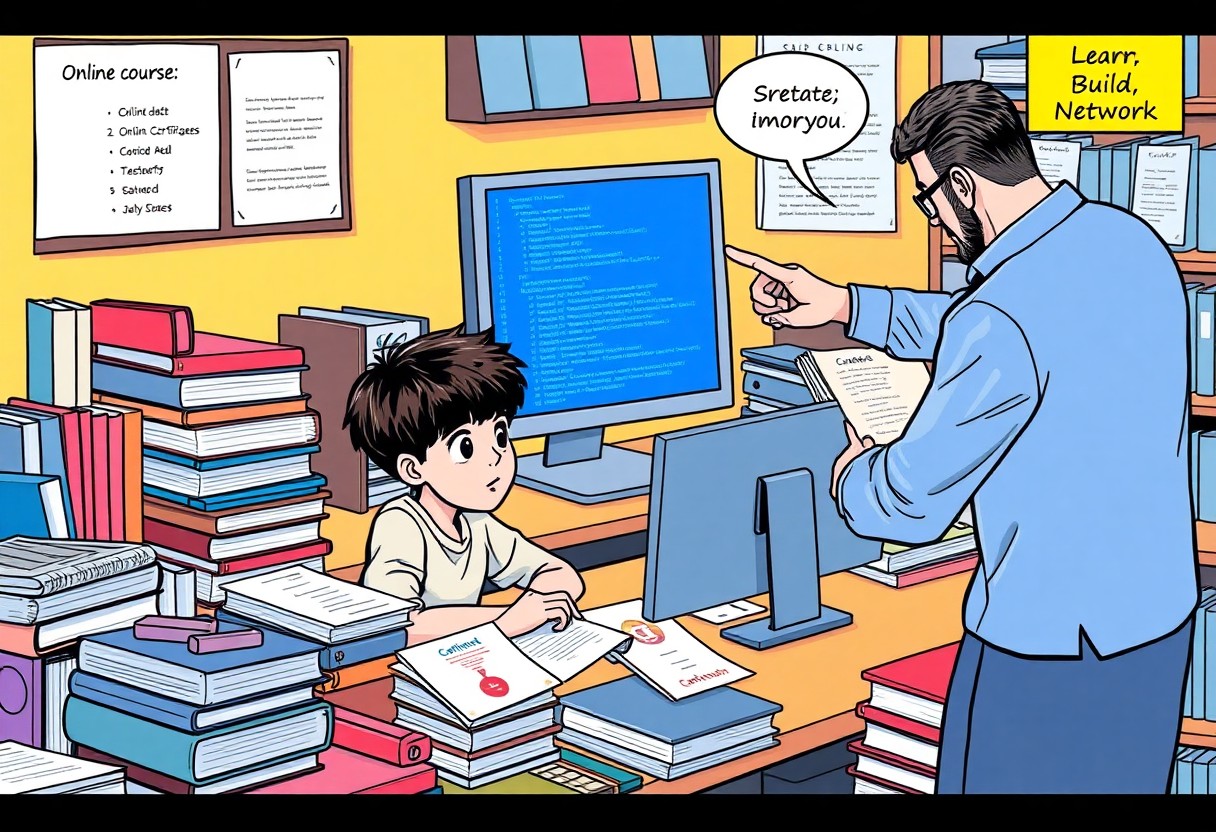This guide will show you how I built a successful career in software development despite lacking formal education. I’ll share practical steps you can take, including self-directed learning, building a portfolio, and leveraging online communities. By focusing on real-world skills and networking, you can open doors to opportunities that may seem out of reach. Your determination and resourcefulness can lead to a thriving career, proving that passion and commitment can outweigh traditional educational paths.
Key Takeaways:
- Build a strong portfolio showcasing personal projects and contributions to open-source software.
- Engage in online communities and networking to find mentorship and job opportunities.
- Continuously learn and adapt by utilizing free resources, courses, and coding challenges online.
Understanding the Software Development Landscape
Overview of Software Development
Software development encompasses the processes and methodologies used to create applications, systems, and solutions tailored to meet user needs. From coding and testing to deployment and maintenance, each stage plays a key role in the lifecycle of a software project. With a diverse range of programming languages and frameworks available, developers can choose the tools that best suit their specific objectives and the demands of the market.
Key Roles and Responsibilities
Within software development, various roles contribute to the overall success of projects. Positions like developers, software engineers, quality assurance testers, and project managers each have distinct responsibilities that are vital for efficient collaboration. Developers focus on writing code, while testers ensure quality by identifying bugs. Project managers coordinate efforts and maintain timelines, creating a harmonious workflow that drives projects to completion.
In practice, developers often take ownership of specific components, translating user requirements into functional software. Their responsibilities may include writing, debugging, and optimizing code, which requires proficiency in programming languages such as Python, Java, or JavaScript. Meanwhile, quality assurance testers conduct systematic evaluations to uncover issues before deployment. Project managers strategize and oversee project direction, ensuring that every team member is aligned with project goals. Each role is interconnected, contributing to the overall integrity and functionality of the software being developed.

Building Essential Skills
Developing key software development skills is fundamental to success in the field. Focus on mastering both technical skills and soft skills that foster collaboration and problem-solving. Techniques range from programming languages to frameworks, along with version control and agile methodologies. Through sustained practice and application, you can effectively enhance your capabilities and marketability.
Programming Languages and Frameworks
Prioritizing specific programming languages and frameworks accelerates your learning curve. Languages such as Python, JavaScript, and Java are in high demand, each serving various applications from web development to data science. Familiarize yourself with popular frameworks like React for front-end development or Django for backend solutions to build robust applications.
Learning Resources and Tools
Numerous resources facilitate your learning journey. Free platforms like Codecademy and freeCodeCamp offer interactive coding lessons, while sites like Coursera and edX provide structured courses from reputable institutions. Utilizing tools such as GitHub not only enhances collaboration but also helps you manage projects effectively. Your online presence is vital; contribute to forums like Stack Overflow to establish your expertise within the community.
Utilizing these learning resources and tools opens doors to hands-on practice and real-world application. Projects on GitHub not only showcase your skills but also serve as a portfolio for potential employers. Moreover, engaging with online coding communities provides feedback and support, helping you refine your work and tackle complex challenges. By continually exploring new materials and participating in discussions, you solidify your understanding of imperative concepts and broaden your skill set.
Gaining Practical Experience
Practical experience is imperative for developing your skills in software development. Engaging in real-world projects not only solidifies your understanding but also builds your resume. Companies often prioritize experience over formal education, making it vital to seek out opportunities that allow you to apply what you’ve learned. Internships, freelance work, or volunteer positions can provide the hands-on practice necessary to enhance your abilities and confidence.
Personal Projects
Creating personal projects lets you explore your interests and build a portfolio. I recommend starting with ideas that resonate with you, whether it’s a simple web app, a game, or a tool to solve a specific problem. These projects demonstrate your initiative and creativity, showcasing your skills to potential employers and clients.
Contributing to Open Source
Contributing to open-source projects exposes you to real-world coding practices and fosters collaboration with other developers. You’ll gain insights into best practices, receive feedback on your code, and expand your professional network. Open-source contributions are a testament to your commitment and can significantly enhance your portfolio.
Engaging with the open-source community can tremendously enhance your software development journey. Platforms like GitHub host numerous projects where you can contribute code, documentation, or even share your testing insights. As you navigate through different issues tagged for beginners, you’ll sharpen your problem-solving skills and learn to work with version control systems like Git. Experienced developers often review and provide feedback on your contributions, offering valuable mentorship. This collaboration not only strengthens your coding abilities but also helps you build a professional reputation within the community.
Networking and Building Connections
Connections play a vital role in advancing your software development career. Engaging with others in the field opens doors to opportunities, insights, and mentorship. I found it invaluable to reach out and connect with other developers, leading to collaborations and job referrals. Check out this article on How I became a software engineer without a degree, or … for further tips on networking.
Online Communities and Forums
Participating in online communities and forums provides an avenue to ask questions, share knowledge, and establish rapport with fellow developers. Platforms like GitHub, Stack Overflow, and Reddit allow me to connect and engage with others, giving and receiving support on various projects. These interactions often lead to friendships and professional relationships that can be instrumental in my career.
Attending Meetups and Conferences
Attending meetups and conferences immerses you in an environment filled with professionals eager to share knowledge and experiences. These events create opportunities to network face-to-face, discuss industry trends, and learn from experts. I’ve found that simply engaging in conversations or exchanging contact information with attendees can yield beneficial relationships and lead to job opportunities.
Crafting a Strong Portfolio
A strong portfolio serves as your personal brand and showcases your skills to potential employers. Include a mix of completed projects, both personal and professional, to demonstrate your abilities across various programming languages and technologies. Your portfolio should not only display the final products but also include descriptions of your role, the challenges you faced, and how you solved them. Keep it updated regularly to reflect your latest work and innovations.
Showcasing Projects and Work
Your projects are the centerpiece of your portfolio, reflecting your creativity and technical prowess. Select a few key pieces that highlight your strengths, such as web applications, mobile apps, or open-source contributions. Providing links to live demos and source code repositories enhances credibility and allows employers to see your work in action.
Highlighting Relevant Experience
Relevant experience reinforces your portfolio and underscores your growth as a developer. Include internships, freelance projects, and volunteer work, emphasizing key responsibilities and achievements. This not only shows your practical skills but also indicates your ability to adapt and learn in diverse environments.
Detailing your relevant experience helps paint a fuller picture of your capabilities. For instance, if you worked on a team to develop an eCommerce website, explain your specific contributions, such as implementing a payment gateway or optimizing site speed. Quantify your impact when possible; mentioning increased sales by 20% or improved user engagement scores gives concrete evidence of your success. Tailor this information to align closely with the type of positions you seek, demonstrating that you understand the needs of potential employers.
Job Search Strategies
Searching for a software development job without formal education requires innovative strategies. Online platforms like GitHub, LinkedIn, and coding forums are important for showcasing your projects and connecting with industry professionals. Participate in hackathons and coding challenges to enhance your skills while expanding your network. Build a personal brand through blogging or vlogging about your development journey to attract attention from potential employers.
Tailoring Resumes and Cover Letters
Creating a tailored resume and cover letter can make a significant difference in landing interviews. Focus on relevant skills, hands-on projects, and achievements that highlight your contributions. Customize each application by aligning your experiences with the job requirements, demonstrating that you’re the perfect fit for the role. This targeted approach showcases your dedication and understanding of the position.
Interview Preparation Tips
Preparation for interviews involves more than just practice questions. I review the company’s products, culture, and tech stack to tailor my responses. Role-playing with peers can simulate real interview conditions, helping you articulate your experiences confidently. Prepare to discuss specific projects, including challenges faced and technical decisions made. This preparation shows you’re invested and knowledgeable about the field.
- company products
- culture
- tech stack
- role-playing
- experiences
Familiarizing yourself with common interview questions in the software development field is vital. I focus on both technical and behavioral questions, understanding that employers value problem-solving skills. Emphasizing your project contributions and the technologies used not only demonstrates your technical prowess but also showcases your ability to work as part of a team. Any effective preparation will set you apart from other candidates.
- technical questions
- behavioral questions
- problem-solving skills
- team contributions
- project technologies
Summing up
Ultimately, building a career in software development without formal education requires dedication, self-motivation, and strategic planning. By leveraging online resources, engaging in hands-on projects, and actively participating in communities, I have found pathways to grow my skills and network effectively. I encourage you to focus on practical experience, pursue continuous learning, and showcase your work through portfolios or open-source contributions. With determination and the right mindset, you can successfully navigate this field and create a rewarding career in software development.
FAQ
Q: Is it possible to get a software development job without a degree?
A: Yes, many companies hire developers based on skills and experience rather than formal education. Building a portfolio with projects, contributing to open-source software, and showcasing skills through coding challenges can demonstrate your abilities to potential employers.
Q: What skills should I focus on developing for a career in software development?
A: Focus on mastering programming languages relevant to your desired field, such as Python, JavaScript, or Java. Additionally, learn about version control systems, web development frameworks, data structures, algorithms, and software development methodologies.
Q: How can I gain practical experience in software development?
A: Engage in personal projects, collaborate on open-source projects, participate in hackathons, and seek internships or freelance opportunities. Online platforms and coding bootcamps can also provide structured learning and practical projects to enhance your skills.
